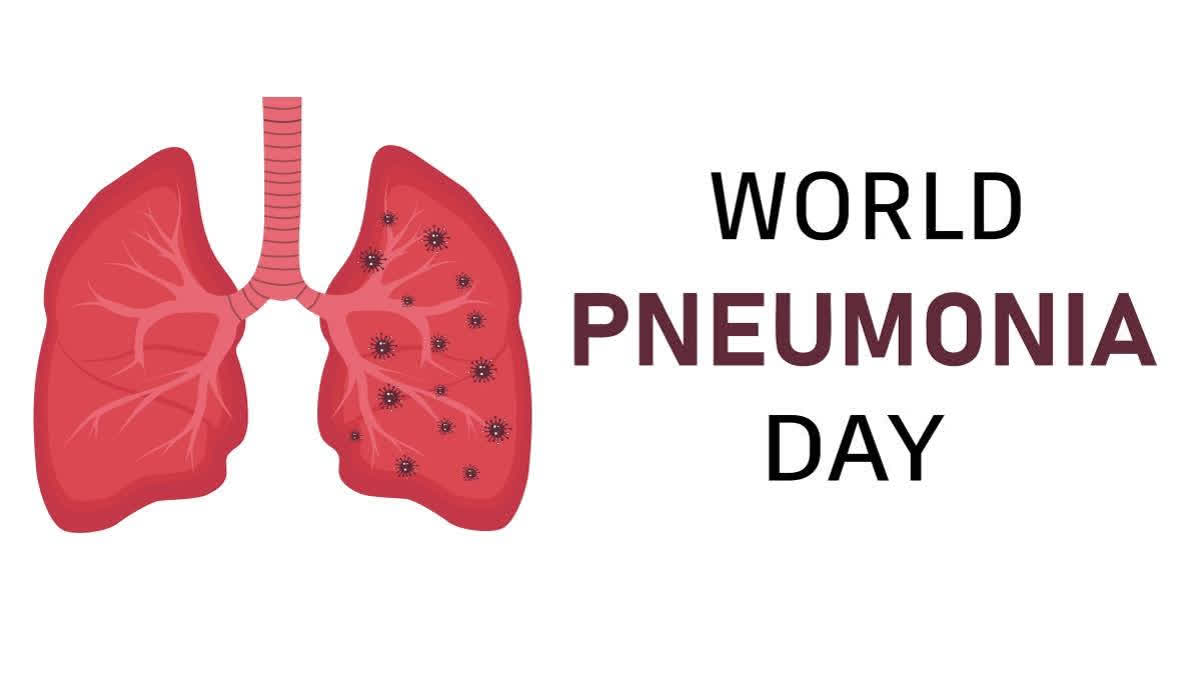New Delhi:World Pneumonia Day is observed across the world on November 12 every year to create awareness and educate people to combat pneumonia, which is the world’s biggest infectious killer of the elderly and children. It is responsible for the majority of deaths of children below five around the world.
The day is mainly targeted for global action in low and middle-income countries to fight the toll due to pneumonia and other respiratory infections.
What is pneumonia
Pneumonia is an acute respiratory infection (ARI) of the lungs caused due to bacteria, viruses or fungal infections. It is a contagious disease and could be fatal for a person with weaker immunity, especially in children and elderly people.
According to UNICEF data, globally, less than two-thirds (59 per cent) of children with symptoms of ARI were taken to a healthcare provider in 2022. “Although it cannot be assumed that all children with symptoms have bacterial ARI and should receive antibiotics, the data indicate a gap in the likelihood of treatment between the richest and the poorest (64 per cent and 50 per cent, respectively),” UNICEF said.
History of World Pneumonia Day
The Global Coalition Against Child Pneumonia, a coalition of various institutions to fight child mortality due to respiratory infection, first World Pneumonia Day was observed on November 12, 2009, under the 'Stop Pneumonia' initiative. Subsequently, the initiative got immense support across the globe, with various government institutions and private organisations advocating for the implementation of better policies and campaigns to educate people and provide better facilities, especially in low and middle-income countries where children suffer from malnutrition and air infections.
Significance
Pneumonia is a preventable and treatable infectious disease. Despite the availability of treatment, the death toll due to pneumonia and other respiratory infectious diseases has risen drastically in recent years.
To fight the risk of respiratory infection and to curb the toll due to a lack of awareness about respiratory infection, World Pneumonia Day plays a crucial role by encouraging various public and private organisations to contribute and organise campaigns at their levels to impart preventive measures and provide facility and making sure no one is deprived of the vaccinations.
World Pneumonia Day 2024
The World Pneumonia Day in 2024 will be observed with the theme “Every Breath Counts: Stop Pneumonia in Its Track”. The theme highlights the significance of every breath and underscores the urgency of stopping pneumonia through early detection, treatment and prevention.
The Data
Pneumonia kills more children than any other infectious disease, claiming the lives of over 7,00,000 children under five every year, or around 2,000 every day. This includes around 1,90,000 newborns. Globally, there are over 1,400 cases of pneumonia per 1,00,000 children, or one case per 71 children every year, with the greatest incidence occurring in South Asia (2,500 cases per 1,00,000 children) and West and Central Africa (1,620 cases per 1,00,000 children), UNICEF data stated.
“Progress in reducing deaths due to pneumonia in children under five has been significantly slower than for other infectious diseases. Since 2000, under-five deaths due to pneumonia have declined by 54 per cent, while deaths due to diarrhoea have decreased by 63 per cent and are now almost half of pneumonia deaths,” the UNICEF said.
Similarly, as per WHO data, pneumonia killed more than 8,08,000 children under the age of five in 2017, accounting for 15% of all deaths of children under five years. People at risk for pneumonia also include adults over the age of 65 and people with preexisting health problems.
Urgency To Defeat Pneumonia
Mortality due to childhood pneumonia is strongly linked to poverty-related factors such as undernutrition, lack of safe drinking water and sanitation, indoor and outdoor air pollution as well as inadequate access to health care. An estimated 18 million more health workers are needed by 2030 to prevent, diagnose and treat pneumonia as well as to reach the Sustainable Development Goal targets on universal health coverage.
UNICEF data said that around half of childhood pneumonia deaths are associated with air pollution. The effects of indoor air pollution kills more children globally than outdoor air pollution. At the same time, around two billion children 0-17 years of age live in areas where outdoor air pollution exceeds international guideline limits.
Protection From Pneumonia
The Integrated Global Action Plan for the Prevention and Control of Pneumonia and Diarrhoea (GAPPD) sets forth an integrated framework of key interventions proven to effectively protect children’s health, prevent disease and appropriately treat children who fall ill with diarrhoea and symptoms of pneumonia.
According to the action plan, exclusive breastfeeding for the first six months of life (without additional foods or liquids, including water) protects infants from disease and guarantees them a food source that is safe, clean, accessible and perfectly tailored to their needs. Nearly one-third of all respiratory infections could be prevented with increased breastfeeding in low and middle-income countries.
The Haemophilus influenzae type b (Hib) and pneumococcal conjugate vaccines (PCV) are effective in preventing the two most common bacterial causes of childhood ARI, including pneumonia. According to the WHO and UNICEF Integrated Management of Childhood Illness guidelines, only those cases classified by a health worker as pneumonia or severe ARI should be treated with antibiotics.
